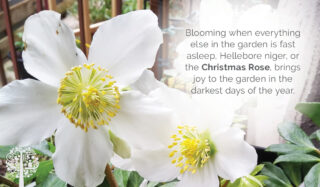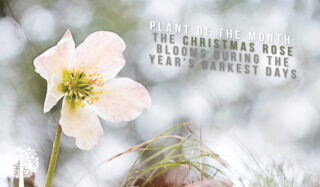The Christmas Rose begs for attention on the darkest and bleakest winter days. The fragile-looking plant is related to the hellebore but, unlike its cousin, faces the light instead of nodding downward.
There are many varieties of hellebore, but ’tis the season, so let’s meet Helleborus niger or, more appropriately, the Christmas Rose (which is not an actual rose). If protected in a greenhouse, covered patio or porch, this perennial’s round, small white sepals and golden yellow stamens will rise out of a mound of glossy evergreen leaves just in time for Santa’s big day.
Hardiness, Light and Soil
Hellebore niger is hardy to climate zone 3 (-40°C) and requires shade and shelter if planted in the ground.
However, as the proud parent of two Hellebore niger, I highly recommend growing them in containers so you can protect and enjoy them without fear of having them buried in the snow or crushed by rain.
Wherever you decide to plant it, the Christmas Rose prefers well-draining humus and porous soil. Although it likes to be moist, this plant is not happy being over-watered.
Propagation
Christmas Roses can be transplanted and divided after several years of growth. But in my experience, they don’t like being disturbed.
The best way to propagate the plant is to wait until the sepal drops its leaves and a seed pod forms. You can snip the pod, break it open and propagate the seeds as usual, or scatter them in the garden to grow new plants. It will take one season to produce a small plant and several before it will have sepal.
Pests and Disease
Once the Christmas Rose is established, care is minimal. However, aphids love it! Colonies will cluster under the plant’s evergreen leaves. The best defence is to check the foliage regularly.
Keep aphids at bay by combining one teaspoon each of dish soap and baking powder with three ground garlic gloves. Then, ferment these ingredients with one cup of vinegar and three cups of water in a spray bottle.
Leaf spot can also be a problem, but it’s easy to solve. Just cut the leaf off at the base of the plant where it meets the dirt, and new growth will soon replace it.
Always wear garden gloves when handling the plant. It is toxic to both humans and pets!
Legend Has It
The legend of how this beautiful plant became known as the Christmas rose is fitting for the season. A young girl visited baby Jesus but had no present to give. She was sad, and as her tears fell onto the snow, the beautiful white Christmas Rose flower grew.
Join me next month for plant of the month as we garden and grow together.

